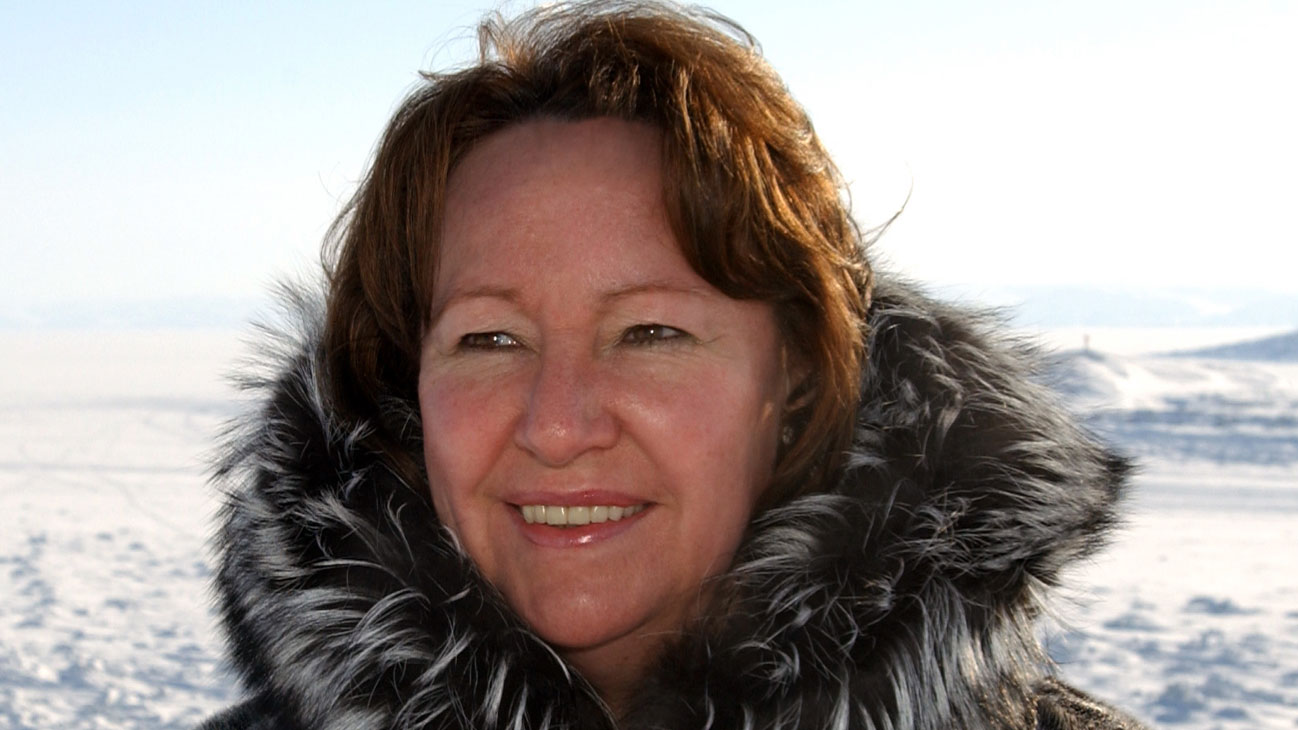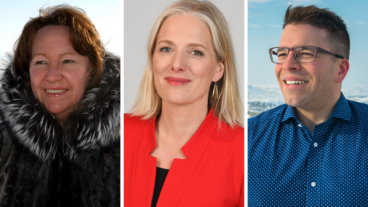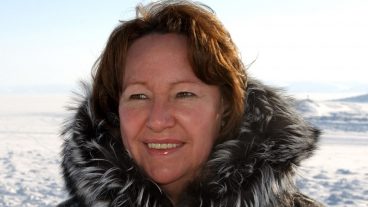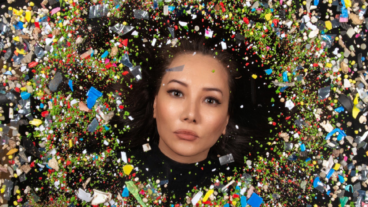Sheila Watt-Cloutier is a pioneer of climate justice — the first to position climate change as a human rights issue, forever changing how the world approaches this global crisis. Where others saw data, she saw human stories. Where others sought power, she sought truth. When others built walls, she built bridges.
A Nobel Peace prize nominee, the recipient of 31 awards and 22 honorary doctorates, and the bestselling author of The Right to Be Cold: One Woman’s Story of Protecting Her Culture, Sheila is now the inaugural Indigenous Climate Fellow at the Pacific Institute for Climate Solutions (PICS). They recently released a four-part podcast series, A Radical Act of Hope, which chronicles Sheila’s journey from the Arctic Tundra to the frontlines of international climate justice, celebrating her achievements and leadership, while providing an intimate look at how Indigenous wisdom can help us solve some of today’s most pressing challenges.
The Beginnings of an Arctic Climate Leader
Born in Kuujjuaq, Québec, Sheila lived a traditional Inuit childhood, spending her winters travelling by dog team, her summers by canoe. She credits the strength of her two main caregivers, her mother and grandmother, for instilling in her the values and resilience that would later shape her global advocacy — the quiet calm of her grandmother and the tenacity of her mother — as well as her culture’s deep connection with the natural world.
For thousands of years, the Inuit people have lived in harmony with the world around them — taking only what they needed, wasting nothing, understanding that their survival depended on having a profound respect and interdependence on the land they called home. It was their identity, their culture, their way of being, and it would become the foundation for how Sheila approached every leadership opportunity and challenge she encountered.
Pioneering Global Environmental Justice
Sheila earned her first major international victory as the president of the Inuit Circumpolar Conference (ICC) Canada. Her work with the ICC focused on representing Inuit interests internationally and advocating for the protection of the Inuit way of life and the Arctic environment. She was pivotal in moving the Stockholm Convention on Persistent Organic Pollutants (POPs) forward.
These highly toxic chemicals were regularly used in global manufacturing and processing with some African countries using them as pesticides to prevent malaria. Alarmingly high levels of these toxins were showing up in the Arctic food supply and within the Inuit people themselves, particularly the breastmilk of Inuit mothers.
To capture the world’s attention and conscience, Sheila put the human face on complex negotiations alongside the science. She led this process with heart, sharing the stories of her people to help the world understand the human dimension and implications for decisions that were about to be made. Her approach worked. The POPs Stockholm Convention became the fastest UN treaty to be signed, ratified, and enforced in UN history, eventually expanding from 12 chemicals to 29.
This success gave Sheila the confidence to tackle an even bigger challenge: reframing climate change as a human rights issue. In 2005, she helped launched the world’s first petition to connect human rights to climate change, arguing that unabated greenhouse gas emissions from the United States violated the human rights of the Arctic’s Indigenous peoples. Working with environmental lawyers, she collected testimonies from 62 Inuit community members, creating a landmark legal document that changed the global conversation.
This pioneering work earned her a co-nomination for the Nobel Peace Prize alongside Al Gore. While Gore received the prize, Sheila won the Right Livelihood Award — widely considered the alternative Nobel Peace Prize.
Leading from the Heart: Conscious Leadership
Sheila calls her approach to climate advocacy “conscious leadership,” which she developed through her experience as an Inuk woman rooted in tradition and culture, and refined as she became a global thought leader on environmental issues and climate change.
Growing up, Sheila’s mother and grandmother modeled the importance of approaching change with love, wisdom, and responsibility — principles that guided her through decades of international negotiations. This foundation also taught her that leadership isn’t about making decisions or holding power, but about bringing connection, calmness, and humility to the table.
Throughout her many global achievements, Sheila’s leadership demonstrated what she calls “radical hopeful leadership”. There are other ways to lead than with rage and anger, she said. Through the heart space, real transformation happens. While data and science matter, she continued, heart makes it a human issue and that’s where lasting change begins.
While the climate challenges we face seem daunting, Sheila says the solutions we seek and need are closer than we think. They are evident in the culture, knowledge and wisdom of Indigenous people. We should be seen not as victims of globalization but as teachers of sustainability, Sheila said.
“Indigenous wisdom is the medicine the world needs. Our values, experience and relationship to the natural world help us to imagine and tell a different story for humanity and the planet, which can guide us towards a more sustainable and equitable future for all.”
What’s Next: Expanding the Message
A Radical New Hope is just the first of many projects Sheila is working on today. She had the chance to work with other Indigenous leaders on a commission urgently addressing the health challenges of Arctic Indigenous peoples for the Lancet, one of the world’s oldest and best known Western medical journals.
The Lancet Commission on Arctic Health was convened to examine the deep health disparities in Indigenous communities caused by the destructive legacy of colonialism and climate change, explore the underlying factors that influence health and well-being, and provide a roadmap to improve the health of Arctic peoples.
Sheila also has a couple documentaries coming out, the first being Tough Old Broads by Stacey Tenenbaum, which will be released later this year. This feature documentary follows three trailblazing women as they continue to make waves in their older years. The second is a documentary series with Netflix on the Arctic, for which Sheila was interviewed quite extensively.
Sheila is also writing her second book which will explore conscious leadership and leading from the heart. Her first book, The Right to Be Cold, was nominated for the 2016 BC National Award for Canadian Non-Fiction and the Shaughnessy Cohen Prize for Political Writing. It was also shortlisted for CBC Canada Reads, defended by Chantal Kreviazuk.
A Model for 21st Century Leadership
At a time when the world faces interconnected crises requiring unprecedented cooperation, Sheila offers a proven model for transformative leadership. Her ability to bridge divides, humanize complex issues, and create lasting policy change makes her voice more essential than ever.
As the Arctic becomes increasingly important geopolitically — being carved up for trade routes and critical minerals — Sheila’s advocacy for Indigenous rights and environmental protection takes on new urgency. Her work demonstrates that the most profound changes come not from force or fear, but from leading with authenticity, love, and radical hope.
Bring Transformative Leadership to Your Organization
For organizations seeking to understand how local actions connect to global impacts, and how to lead with both heart and effectiveness, Sheila’s journey offers invaluable lessons. Her podcast provides an intimate window into this journey, while her speaking engagements offer audiences the chance to learn directly from one of our time’s most influential Indigenous leaders.
Ready to bring transformative leadership to your organization? Contact us to book Sheila Watt-Cloutier as your next keynote speaker and discover how conscious leadership can create lasting change in an interconnected world.




